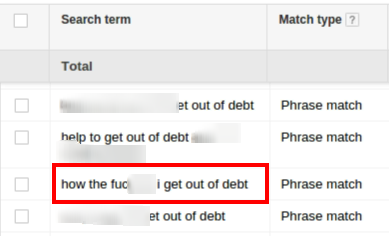Do you want your Amazon advertising campaign to perform better? Negative keywords can help you spend less money and can prevent uninterested consumers from clicking your ads.
What are Negative Keywords?
A key feature of keyword optimisation for online advertising campaigns is the use of negative keywords.
Here is a quick definition of what these keywords are:
A specific term that stops your ads from being triggered for a word or phrase
With the help of negative keywords, advertisers can specify keywords with which they do not want their ads to be related. By adding negative keywords with their match types, ad targeting may be enhanced, click-through rates can be raised, and wasted ad expenditure can be decreased.
Type of Keywords one can add as Negative Keywords
The type of keywords/ terms that you can consider as negative keywords are:
1. Irrelevant Keywords
Keywords that are not related to your product or service should be added as negative keywords. For example, if you sell coffee, you may want to add negative keywords such as “tea, juice, soda, cold drinks, milkshakes etc. These keywords can be identified through a search term report.
2. Low-converting Keywords
Keywords that generate a lot of clicks but few conversions should be added as negative keywords. This can help to improve the overall conversion rate of your campaign. For example, if you find that the keyword “free coffee” generates a lot of clicks but few sales, you may want to add it as a negative keyword.
3. Competitor Brand Names
Using competitor brand names as negative keywords can be an effective strategy. By excluding them from your ad targeting, you can avoid wasting ad spend on users who are primarily searching for your competitors’ products.
But there are certain things you need to remember:
- Take care of any trademark or intellectual property rights
- Try to use competitor brand names as negative keywords as per your specific goals and the behaviour of your targeted audiences.
- Try not to exclude all competitor brand names as it might cause you to miss out on those customers who are looking for multiple options.
4. Close variants of a Negative Keyword
It is important to consider close variants while using negative keywords in Amazon advertising. By default, Amazon shows your ads for close variants of your targeted keywords and this can help you reach a wider audience and increase your chances of getting clicks and conversions. However, this can also lead to irrelevant clicks. To avoid this, you can add those close variants as negative keywords.
For instance, if your targeted keyword is formal shoes, you would want to add close variants like casual shoes, sneakers, flip flops, walking shoes etc as negative keywords to avoid unwanted clicks.
5. Underperforming / Unproductive keywords
Underperforming keywords are those keywords that are generating clicks but not leading to sales or not getting clicks or conversions. By adding them as negative keywords, you can focus your ad spend on more relevant keywords.
Note: Conducting negative keyword research can help you to identify keywords that may not be relevant to your business. Our tool can help you to do the same.
Karooya’s Amazon Negative Keyword Tool is Free for accounts with a monthly spend of less than $3000. Sign up today to improve your ACoS.
Is it accurate to consider curse words as negative keywords?
Irrelevant search phrases may contain curse words or swear words. Now that voice search is an option, users of mobile devices or even desktop or laptop computers prefer to speak into the search box rather than typing a few random terms. And using these curse words out of irritation or rage may show in those irrelevant queries.
Search queries such as ‘Where the f*** can I find a good hotel in NY‘ or ‘How the **** can I fix my car’ etc. are admissible queries. If you happen to operate a hotel chain in New York, you could potentially address the frustration of these users by displaying your advertisement immediately. This is an excellent way to engage your audience, particularly when they are feeling curious or angry.
Here’s an example of what users are searching for
Researching such keyword trends and using them as phrase match types might be a good idea if you want to avoid showing up for harmful search terms. Google Analytics or Search Console may provide you with more information about how to find such suitable terms.
Wrapping it up
You might notice the same set of negative keywords throughout all of your campaigns when you expand and begin running more than one ad. To save time, you can create a shared negative keyword list and add these keywords to all your campaigns. Also, you can use our Search Archive function to check previous search query information and extract irrelevant phrases from there.
Related Links






Stop the wasted ad spend. Get more conversions from the same ad budget.
Our customers save over $16 Million per year on Google and Amazon Ads.